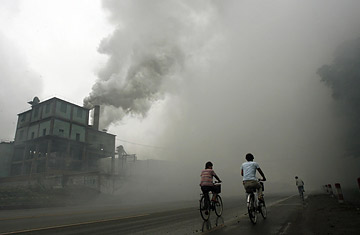
Cyclists pass through thick pollution from a factory in Yutian, in China's northwest Hebei province.
Read quickly, the latest White House statement on climate change may have sounded like news — good news. On Monday, Daniel Price, the Deputy National Security Adviser for International Economic Affairs, told reporters in Paris that the U.S. would be willing to accept mandatory international limits on greenhouse gas emissions. Coming from an Administration that has steadfastly resisted mandatory caps, withdrawn from the Kyoto Protocol and effectively derailed any serious global effort to slow climate change, this could have been a big deal. But as is so often the case with the Bush Administration's environmental policies, the devil is in the details.
Consider Price's exact words: "The U.S. is prepared to enter into binding international obligations to reduce greenhouse gases as part of a global agreement in which all major economies similarly undertake binding international obligations." The last reference is not to the major economies of Western Europe or Japan, all of which have already signed onto the Kyoto Protocol and already work with carbon caps. The U.S. official is referring to the major developing economies, specifically China and India, which the Kyoto Protocol exempts from binding limits on their rapidly growing greenhouse gas emissions.
And there lies the rub: The chance of either China and India — two countries that remain poor, despite the speed at which their economies are growing — accepting limits on their greenhouse gas emissions is virtually nil. In fact, Chinese officials recently reiterated their own stock position that global warming is chiefly the responsibility of the developed nations that have been burning carbon at industrial rates over a century during which China and India barely registered on the global economic scale. So, as long as the U.S. — by far the world's top carbon emitter by historical standards — insists that it won't move until China and India do, the deadlock remains. As Yvo de Boer, the U.N.'s top climate change official, told the Associated Press: "If it's a quid pro quo, it's a nonstarter."
Hard as it may be for environmentalists to accept, the Bush Administration isn't entirely in the wrong. When the United Nations Framework on Climate Change — the international treaty that formed the basis for Kyoto — was hammered out in Rio de Janeiro in 1992, no one could have predicted just how rapidly China's economy and energy use would grow. China is, in fact, about to pass the U.S. as the world's top annual carbon emitter, and the bulk of future greenhouse gas emissions (the only kind we can hope to control now) will, in fact, come from the developing world. "Europe and the U.S. could turn out the lights today, and come 2030 or 2050 we would not have addressed the problem of climate change," Price noted in Paris.
Any system such as Kyoto that lumps a carbon superpower like China in the same category as industrial minnows such as Bangladesh needs to be rethought, as the Bush Administration frequently argues. But step one in that process will require the U.S. to accept its responsibility and act first, taking on binding limits on its own and putting pressure on China and India to follow. With less than a year left in office, it seems increasingly unlikely this Administration will do so — no matter how its officials couch the position.
